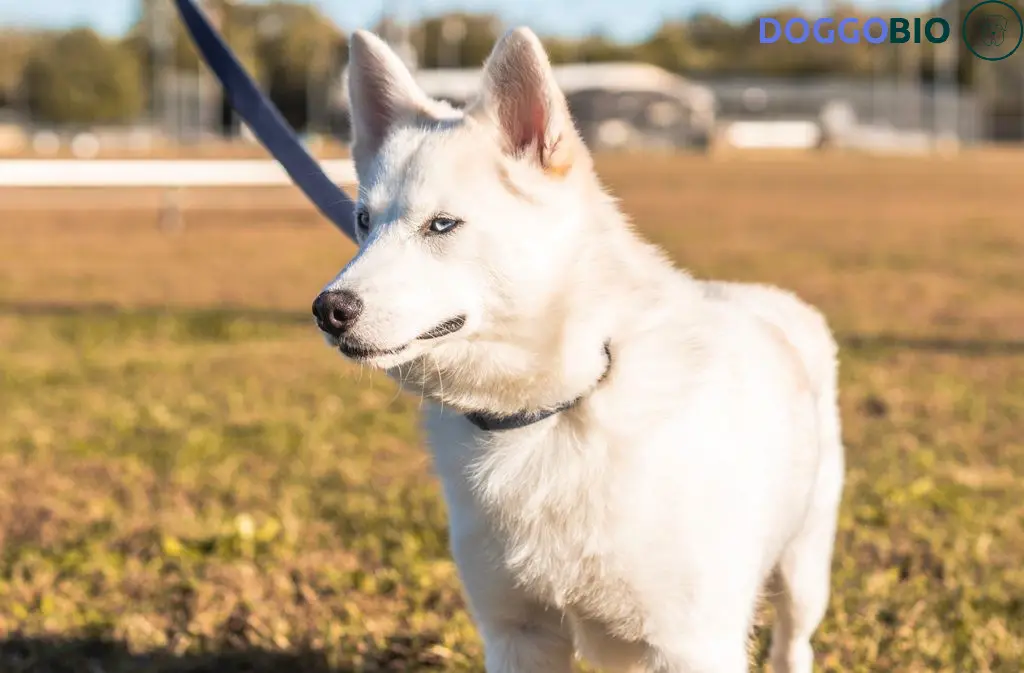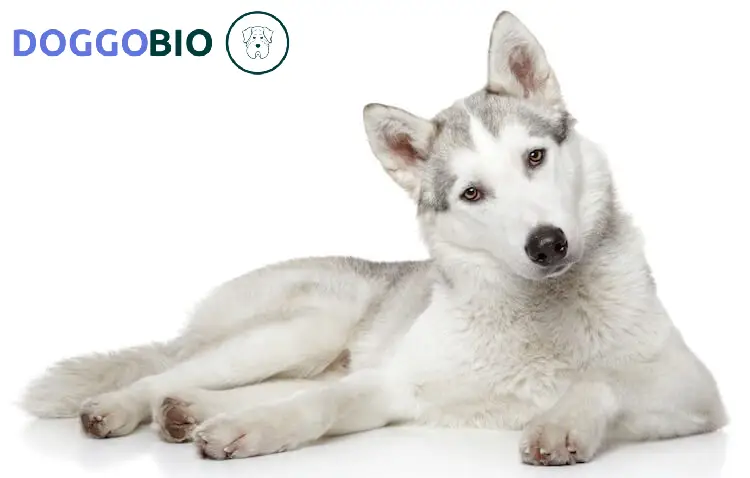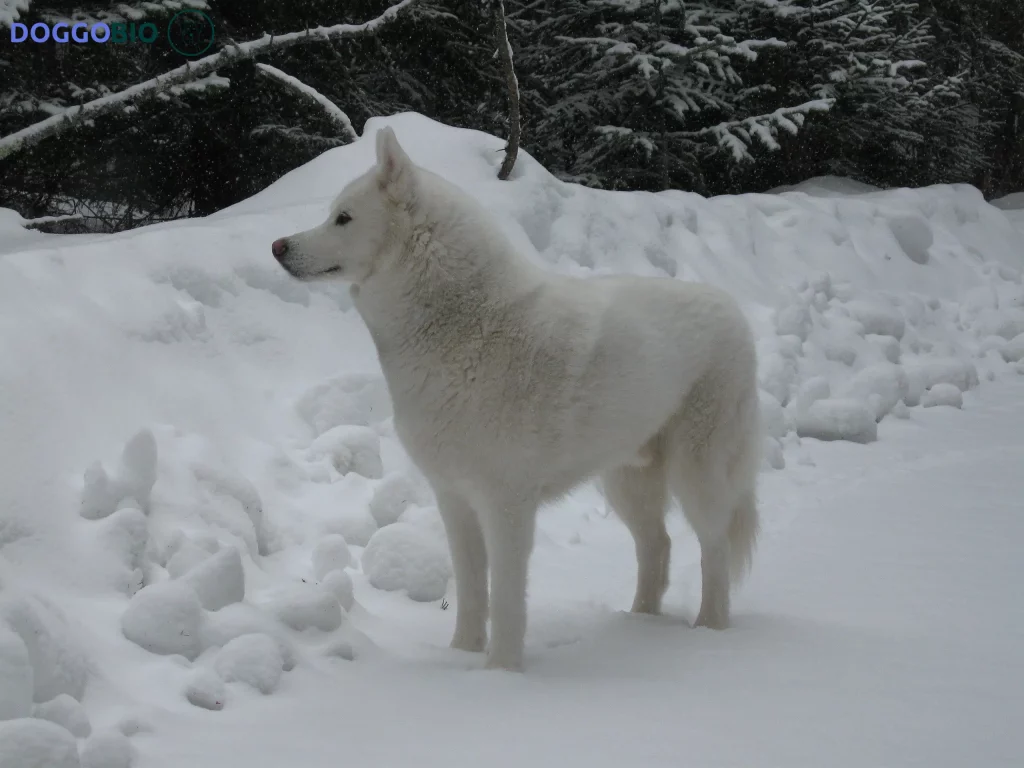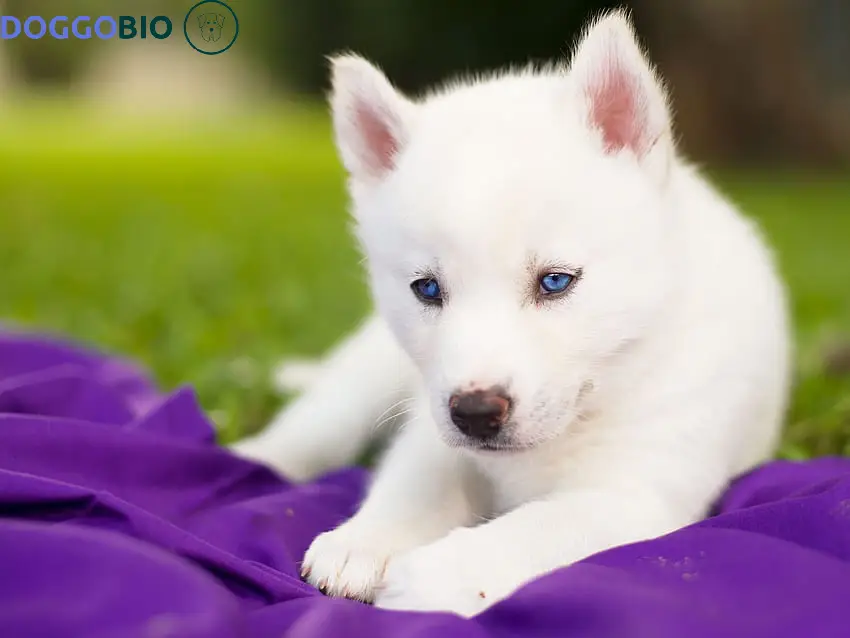All White Husky is a captivating and one-of-a-kind breed of dog known for their striking white coat and piercing blue eyes.
They are true showstoppers and make a great addition to any family. However, it’s important to remember that owning a White Husky is not just about having a beautiful pet but also a big responsibility.
This Complete Guide for All White Huskies provides you with all the information you need to decide whether you’re considering adding a White Husky to your family or you’re already a proud owner.
From understanding their history and characteristics to providing proper training, grooming, and healthcare, this guide is your go-to source for all White Huskies. With the appropriate care and training, White Huskies can be the perfect companion, known for their loving nature and unique beauty.
So, whether you’re a new or experienced owner, this guide is a must-read to ensure your White Husky thrives in their forever home.
What Is a White Husky?

A White Husky is a Siberian Husky with a white coat color. They are known for their striking appearance, piercing blue eyes, and fluffy white coats.
Siberian Huskies are a spitz-type breed of dog originating from the Chukotka region of northeastern Siberia. The Chukchi people bred them to pull sleds and herd reindeer. White is not a standard color for the breed, but some individuals can be born with a white coat due to a genetic mutation. White Huskies are not a separate breed but a variation of the Siberian Husky breed. They have the same temperament, energy level, and exercise needs as their non-white counterparts.
Where Do White Huskies Come From?
White Huskies come from the same place as regular Siberian Huskies, the Chukotka region of northeastern Siberia. They are a variation of the Siberian Husky breed that can be born with a white coat due to a genetic mutation.
Siberian Huskies are an ancient dog breed believed to have been bred by the Chukchi people of northeastern Siberia for thousands of years. They were used as working dogs to pull sleds and herd reindeer. In the early 20th century, the breed was brought to Alaska and used as a sled dog during the gold rush. From there, the breed spread to other parts of the world, including North America and Europe. White Huskies are not a separate breed but a variation of the Siberian Husky breed. They have the same temperament, energy level, and exercise needs as their non-white counterparts.
Are White Huskies Rare?
White Huskies are not considered rare, but they are less common than the traditional colors of the Siberian Husky breed.
Siberian Huskies come in various colors, such as black, grey, and red, with white being less common due to a genetic mutation. White coat color results from a piebald gene, which is a recessive gene, meaning that both parents must carry the gene to produce a white-coated puppy.
So, although not rare, White Huskies are less common than the traditional colors of the breed because of the genetic factor. Additionally, some breeders may not breed for the white color because it is less common, making them harder to find.
All White Husky Breed Guide
- Regarding exercise, White Huskies are high-energy dogs that require plenty of physical activity to keep them happy and healthy. They were bred to work and have a strong work ethic that needs to be met through regular exercises, such as running, hiking, or agility training. It’s important to remember that these dogs have a high prey drive, so they should always be kept on a leash or in a securely fenced area when outside.
- White Huskies also have specific grooming needs due to their thick, fluffy coat. They shed heavily twice a year, and regular brushing is essential to keep the shedding under control. They also require regular bathing, nail trimming, and ear cleaning.
- White Huskies are generally healthy but can be prone to specific health issues such as hip dysplasia, cataracts, and bloat. Purchasing your White Husky from a reputable breeder who conducts health screenings on their breeding dogs is essential.
- White Huskies are a beautiful and unique variation of the Siberian Husky breed. They are friendly, outgoing, and highly social animals that crave human interaction and enjoy being around other dogs and people. They are also intelligent and easy to train but require regular exercise, grooming, and a secure, thriving environment. A White Husky can be an excellent addition to your family if you’re willing to put in the time and effort to meet their needs.
What Does a White Husky Look Like?

White Huskies are a variation of the Siberian Husky breed known for their striking white coat. Their coat is thick and fluffy, with a soft, dense undercoat and a longer, coarse outer coat. They have a thick ruff around their neck and chest, and their tail is typically well-furred.
White Huskies have a distinctive look with piercing blue or sometimes brown eyes, resulting from the piebald gene that causes their coat color. Their eyes are almond-shaped and set wide apart, giving them a friendly and expressive appearance. They also have a black or grey fur mask around their eyes, adding to their unique appearance.
In terms of size, White Huskies are a medium-sized breed that typically weighs between 35-60 pounds and stands 20-23 inches tall at the shoulder. They have a well-proportioned and athletic build and sturdy and well-muscled bodies.
Overall, White Huskies are a beautiful and unique variation of the Siberian Husky breed known for their striking white coat, blue eyes, and distinctive mask of black or grey fur around their eyes. They have a friendly and expressive appearance and a well-proportioned and athletic build.
White Husky Color Genetics
White Huskies are a variation of the Siberian Husky breed known for their striking white coat. The color of a White Husky’s coat is determined by genetics. The gene that controls coat color in dogs is called the melanocortin one receptor (MC1R) gene. The specific mutation that causes a White Husky’s coat color is called the “piebald” gene.
The piebald gene inhibits pigmentation production in some regions of the coat. In the case of White Huskies, the gene causes a lack of pigmentation in the skin, resulting in a white or light-colored coat.
White Huskies can have different variations of the piebald gene. Some White Huskies may have a primarily white coat with small amounts of other colors, while others may have entirely white skin. Additionally, some White Huskies may have blue eyes, while others may have brown eyes. This is because the piebald gene can also affect the color of the eyes.
It’s important to note that the piebald gene is considered a “recessive” gene, meaning that for a dog to express the piebald coat color, it must have two copies of the gene, one from each parent. Therefore, breeding two White Huskies together will increase the probability of producing White Husky puppies, but generating a White Husky with a non-white husky will have a mix of White and non-white puppies.
White huskies are not a separate breed; they are a variation of the Siberian Husky breed and have the same temperament, energy level, and exercise needs as their non-white counterparts. However, it’s important to note that their coat color makes them more susceptible to sunburn and skin cancer, so extra care should be taken when exposing them to the sun.
Fun Facts About All White Husky

Let me share some fun facts about the amazing White Husky!
- These pups are nicknamed “Houdini” because they love to escape enclosures. They are adventurous and have a high prey drive, so they have a tall fence to keep them safe.
- The White Husky is loved worldwide, but they truly shine in cold weather. Just remember, they may struggle a bit in the heat.
- The Siberian Husky comes from a long line of sledding dogs, so they have a ton of energy. They love to run and play and need a good amount of food to fuel their active lifestyle.
- White Huskies are smart cookies but can also be a little stubborn. With patience and experience, they make great training partners.
- These dogs are always up for a good adventure! They need at least 90 minutes of exercise daily and love hiking and running. Don’t try to take them swimming, as they aren’t fans of water.
Do White Husky Puppies Stay White as They Grow?
White Husky puppies may change color as they mature. While some may remain white, others may develop black, grey, copper, or sable markings. The exact coloring can vary and is influenced by genetics. It’s not uncommon for White Huskies to change color as they grow, so their appearance may differ as adults compared to their puppy days.
White Husky Temperament and Personality
The White Husky is a proud descendant of working dogs from colder regions known for their hardworking nature. They are highly attentive and focused on tasks, making them excellent workers.
Not only is White Huskies hardworking, but they are also incredibly social animals that thrive on human and pet interaction. These loving dogs love to cuddle and be a part of the family.
However, it’s important to note that White Huskies need mental stimulation and regular exercise. They may exhibit negative behaviors like digging or slight aggression when left unattended or under-stimulated for extended periods. They are also known for their escape artist skills.
Despite their tendency to howl, White Huskies are relatively quiet dogs. Regular training and socialization are essential to maintain their mental health. Training can be done in the dog park, and socialization with other dogs should start when they’re still puppies.
White Huskies are a bundle of joy and are easily trainable due to their intelligence. They love participating in their human family’s activities and cuddling up for snuggles.
White Husky Lifespan and Health Issues

Like other Huskies, a white Husky is expected to live 12-14 years. Despite their longevity, they can still be susceptible to common breed-related illnesses, such as congenital deafness caused by the piebald gene.
The following health issues may occur if proper care is not provided:
- Hip dysplasia, a common concern among Husky owners, often affects white Huskies due to their bone structure.
- Hypothyroidism, resulting from abnormal thyroid gland secretion, can lead to weight gain and hair loss.
- Skin problems caused by food allergies, underlying illnesses, or genetics can lead to scarring, hair loss, and infections.
To ensure the well-being of your white Husky, it’s essential to know its medical history before rehoming. As an owner, you’ll better understand what’s best for your dog’s health.
How Much Does a White Husky Cost?
The white Siberian Husky is one of the most sought-after dog breeds in the world, with demand just as high as the standard Husky.
The cost of a white Husky puppy can range from $500 to $800, with champion bloodlines starting at $1,500. Keep in mind that the purchase price is just the beginning. To keep your furry friend happy and healthy, additional expenses must be considered.
Here is a table summarizing the estimated costs of some everyday expenses for a white Siberian Husky:
| Type of Expense | Cost |
| Food and Treats | $80 – $100 |
| Food and Water Bowls | $10 – $30 |
| Bed | $40 – $180 |
| Crate | $50 – $370 |
| Leashes and Collars | $15 – $50 |
| Toys | $30 – $40 |
| Grooming Essentials | $40 – $160 |
| Deworming, Flea, and Tick Medications | $50 – $200 |
| Initial Vet Visits | $100 – $300 |
| Initial Vaccine Shot | $75 – $200 |
| Neutering or Spaying | $50 – $500 |
| Dog License | $10 – $20 |
| Microchip | $40 – $60 |
| Miscellaneous Supplies | $15 – $30 |
| Total Initial Cost | $605 – $2,240 |
These costs will help ensure your white Siberian Husky is well taken care of and happy for years!
Places to Find White Husky Puppies for Sale or Adoption
If you’re interested in owning a white Siberian Husky, it’s crucial to find a reputable breeder who prioritizes the well-being of their dogs. Before making a purchase, educate yourself on how to buy a dog online safely and avoid unscrupulous breeders. Here are some top-rated white Husky breeders to consider:
- Husky Palace: With 17 years of experience, this breeder specializes in breeding healthy and gorgeous Siberian Huskies, including white ones. All their pups are AKC-registered and have received numerous awards.
- Bama Huskies: Operating for 23 years, Bama Huskies is dedicated to breeding top-quality Siberian Huskies and training them in agility. The Better Business Bureau accredits it with an A+ rating.
- The Siberian Empire: Since 2014, this breeder has produced high-quality Siberian Huskies nationwide. They are part of the Bred with H.E.A.R.T. program and a Good Dog certified breeder.
Adopting a dog can also be a great option, saving a life and reducing expenses. Here are some rescue organizations offering white Siberian Huskies for adoption:
- Husky House: A non-profit that rescues abandoned, abused, and lost Siberian Huskies, including white ones. Active since 2015.
- Texas Husky Rescue: Their mission is to educate the public on proper Husky care and find new homes for mistreated and abandoned Huskies.
- Shadow Husky Rescue: A non-profit dedicated to rescuing Huskies, including white ones, from abandonment, mistreatment, and euthanasia.
Explore additional options by checking out lists of the best Siberian Husky breeders and rescue organizations.
Dog Name Ideas for White Husky Puppies
Here are some dog name ideas for white Husky puppies:
Male names:
- Frost
- Ghost
- Blizzard
- Ice
- Snowball
- Winter
- Nimbus
- Silver
- Aspen
- Diamond
Female names:
- Luna
- Pearl
- Ice Queen
- Snowflake
- Winter
- Willow
- Bella
- Ivory
- Diamond
- Blizzard.
List of dogs that are similar to White Husky
- Husky-Dalmatian Mix
- Husky-French Bulldog Mix
- Husky-Doberman Mix
- Husky-Rottweiler Mix
- Husky-Pug Mix
- Husky-Yorkie Mix
- Husky-Greyhound Mix
- Husky-St Bernard Mix
- Husky-Great Dane Mix
- Husky-Cane Corso Mix
- Miniature Husky
- Husky-Chihuahua Mix
- Husky-Blue Heeler Mix
Frequently Asked Questions
1. What Is the Rarest Husky Color?
The rarest Husky color is the solid white Husky.
2. Are White Huskies Good Pets?
White Siberian Huskies can be good pets if they are well-trained, socialized, and receive proper exercise and care.
Like any dog breed, the individual personality and behavior of a white Husky will vary. Still, they are generally friendly, energetic, and affectionate dogs that get along well with families and other pets.
As with any pet, it’s essential to research and understand the breed’s needs and traits to determine whether they fit you and your lifestyle well.
3. Are All White Huskies Deaf?
No, not all white huskies are deaf. The color white in huskies are not linked to deafness, and it is a genetic coincidence if a white husky is also deaf. Deafness in huskies is a complex issue caused by genetic and environmental factors and is not solely determined by coat color.
4. Do White Huskies Shed a Lot?
White Siberian Huskies are heavy shedders and shed their fur twice a year, like all other Huskies. It is essential to be prepared for this and to groom your Husky regularly to minimize the amount of shedding.
5.Are White Huskies Hypoallergenic?
No, White Huskies are not hypoallergenic. They have a thick double coat that sheds seasonally and produces dander, which can trigger allergies in people with pet allergies.
Conclusion: Is a White Siberian Husky the Right Dog for You?
In conclusion, a White Siberian Husky can be an excellent pet for those who enjoy an active lifestyle and can provide plenty of exercise and attention. However, they are only suited for some. They have a thick coat that sheds seasonally and produces dander, which can trigger allergies in people with pet allergies.
Additionally, they are known to be independent and challenging to train, so they may not be the best choice for first-time dog owners. It’s essential to carefully consider your lifestyle and needs before deciding if a White Siberian Husky is the right dog for you.
